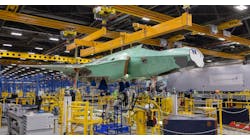Pratt & Whitney introduced a new geared-turbofan engine for the Airbus A320neo, offering one-percent lower fuel consumption than the preceding model, extending the economic and environmental benefits of the GTF engine series, according to the engine builder. P&W claimed the GTF Advantage engine decreases fuel consumption and CO2 emissions by 17 percent compared to prior-generation engines and added that it will be compatible with 100-percent sustainable aviation fuel (SAF) at entry into service.
Like all the manufacturers of commercial aircraft engines, Pratt & Whitney is working to incorporate SAF, as part of the industry’s effort to achieve net-zero emissions by 2050.
The GTF series entered commercial service in 2016, with the introduction of the Airbus A320neo.
The GTF Advantage configuration includes technology enhancements throughout the engine core, for which Pratt & Whitney has already completed more than a year of ground and flight testing. The new engine will be available for A320neo aircraft starting in January 2024.
Airbus A320neo twin-engine jets are a series of narrow-body aircraft (A319, A320 and A321) developed to improve operating efficiency for carriers, and adopting aerodynamic improvements as well as new engines, either the Pratt & Whitney GTF or CFM International LEAP-1A.
The new GTF Advantage engine will deliver higher thrust, making it the most powerful engine for the A320neo series and allowing greater range and higher payloads.
"GTF engines met or exceeded fuel, emissions and noise commitments from day one and have since achieved a strong record of dependability and low operating cost," stated Carroll Lane, president of Commercial Engines at Pratt & Whitney. "GTF Advantage provides even more value to our customers, both in revenue potential and environmental impact, with lower fuel burn and new route opportunities."






